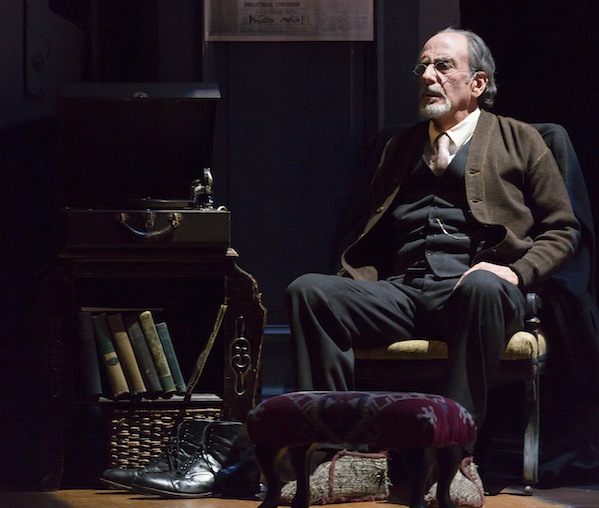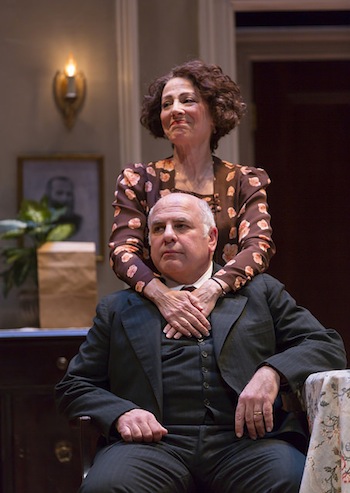Theater Review: “Awake and Sing!”? Too Much Bickering
In this production the aching tension of intractable conflicts — freedom versus responsibility, money versus morality — occasionally bubble to the surface, but too often they are buried beneath family squabbling.
Awake and Sing! by Clifford Odets. Directed by Melia Bensussen. Staged by the Huntington Theatre Company at the Boston University Theatre through Dec. 7.

Will LeBow in the Huntington Theatre Company production of Clifford Odets’ s “Awake and Sing!” Photo: T. Charles Erickson.
By Terry Byrne
Clifford Odets’ Depression-era drama Awake and Sing! resonates with timeless family conflicts, but the Huntington Theatre Company’s current production is cluttered with clichés. Every once in a while, the aching tension of intractable conflicts — freedom versus responsibility, money versus morality — bubble to the surface, but too often they are buried beneath the shrill sound of the squabbling Bergers.
Inside a crowded fifth floor Bronx walk-up, Berger matriarch Bessie (Lori Wilner) stirs up trouble with an acid tongue and bitter desperation. The family is barely able to pay the rent and put food on the table and that sense of economic uncertainty brings out the worst in everyone. While the strong-willed family matriarch is a staple of many dramas, Wilner’s performance is unrelenting, offering nary a glimpse of vulnerability or a suggestion of sympathy.
Although Odets’ setting is uniquely small scale – an overcrowded apartment where no one has any privacy – his lyrical language, festooned with idioms and Yiddish expressions, capture the larger world of optimistic ideals clashing with broken realities, of hope for the future versus resignation in the now. But this ensemble, directed by Melia Bensussen, rarely appears comfortable with Odets’s words in their mouths. It’s true some of the 1930s references are dated, but the notion of family members trying to find their way in a world where their options are limited should feel timeless and universal.

Lori Wilner and David Wohl in the HTC’s production of Clifford Odets’s “Awake and Sing!” Photo: T. Charles Erickson
Within the Berger family, as in many families, nasty words may be exchanged, but there must be a strong foundation of love that binds them. In this production, however, it’s hard to feel a connection between any of these family members. Thank goodness for Will LeBow, who plays Jacob, Bessie’s father, with a potent mix of despair and determination. Relegated to the role of dependent old man, dismissed by his daughter, Jacob tries to maintain his dignity while insisting there is more to life than money. His grandson Ralph (Michael Goldsmith) finds Jacob’s call to act the most compelling, especially since, at the age 22, he is already stuck in a low-paying, dead-end job. Unfortunately, Goldsmith races through his lines so quickly that much of the figure’s angst and energy are lost in a jumble of words. Ralph’s sister Hennie (Annie Purcell), for her part, has resigned herself to a loveless marriage for the sake of her baby.
The Berger apartment also holds Myron (David Wohl), Bessie’s hapless husband, who seems blissfully oblivious to Bessie’s worries, and Moe Axelrod (Eric T. Miller), a family friend and later a boarder. It’s Moe, the outsider, a disabled veteran and a bookie, who ultimately shakes up the Berger’s world. Miller balances Moe’s tough-talking exterior with a tenderness that honors Jacob’s integrity, encourages Ralph’s spirit, and melts Hennie’s heart.
The shadow of the wolf at the door hovers over the proceedings, but James Noone’s set doesn’t have enough of a threadbare feel, and Michael Krass’s costumes look way beyond the Berger women’s budget (the women’s array of shoes were distractingly beautiful).
Miller and LeBow’s performances provide some desperately needed nuance and complexity to the stock characterizations assembled on the Huntington stage. Odets’s sometime strident message requires an essential infusion of humanity for the Bergers’ struggles to rise above petty arguments to become an emotionally stirring call to “awake and sing.”
Terry Byrne has been writing about the arts for nearly two decades. She has an MFA in Playwriting from Boston University and is a Resident Scholar at Brandeis University’s Women’s Studies Research Center.
